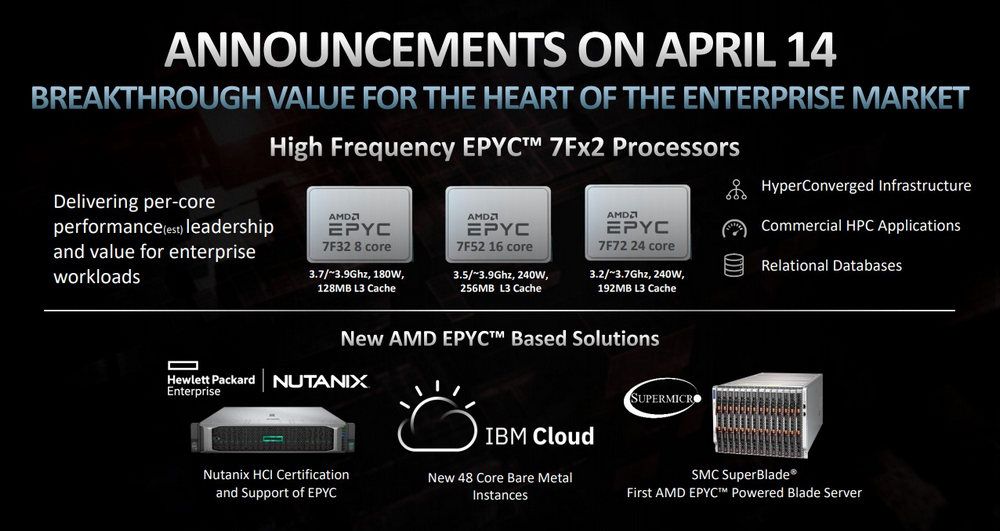AMD is renewing its server processor series with the EPYC 7Fx2 CPUs, with a focus on improving the price-performance aspect compared to its competitor Intel and the current EPYC ‘Rome’ series itself.
EPYC 7Fx2: Renewed series with the 8-core, 16-core and 24-core CPUs 7F32, 7F52, 7F72
AMD expects the addition of three new models to confirm the company as a leader in the server market. These models are the EPYC 7F32, 7F52, 7F72 with 8, 16 and 24 cores respectively.
The renewed EPYC 7F32 has 8 cores with frequencies from 3.7 to a maximum of 3.9 GHz. It has 128 MB and its TDP is configured for 180 W.
The EPYC 7F52 has 16 cores and operates at frequencies of 3.5 and 3.9 GHz. The L3 cache is 256 MB and its TDP is 240 W.
Finally, we have the EPYC 7F72, which increases the number of cores to 24. This chip has a base frequency of 3.2 GHz and reaches 3.7 GHz. The L3 cache is 192 MB and has a TDP of 240 W.
We recommend reading the best processors on the market
The three new EPYC 7Fx2 models aim to further improve the price/performance ratio and performance per core, as shown by the shared AMD graphics comparing them to Intel Xeon processors using the SPECrate®2017_int_base 2P benchmark tool.
Increased performance per core and cost/performance
AMD places special emphasis on the 16-core EPYC 7F52, which compares favorably with the Intel Xeon Gold 6242 and 6246R. The AMD chip has some technological advantages that make it more attractive for companies. The EPYC is roughly equivalent in price, is superior and supports more RAM (4TB), 3200 MHz memory (2999 MHz in the Xeon) and even PCIe 4.0. In addition, the cache per core is 16 MB, eight times more than Intel’s options.
With these benefits, it’s not surprising that many of the world’s leading companies rely on EPYC technology; Amazon, Microsoft, Google, IBM, Oracle and Tencent are some of AMD’s key partners who already use it on their servers.
One of the first products to use the new EPYC processors is the X4 Dell PowerEdge R6525, a dual-socket system that uses the 7F72 chip for a total of 48 cores. AMD announced that this system set the world record for performance in a 4-node system on VMmark 3.
In the meantime, the red company is already preparing the replacement for EPYC “Rome” with the code name “Milan”, which is based on Zen 3 and will further increase performance. We will keep you informed.
